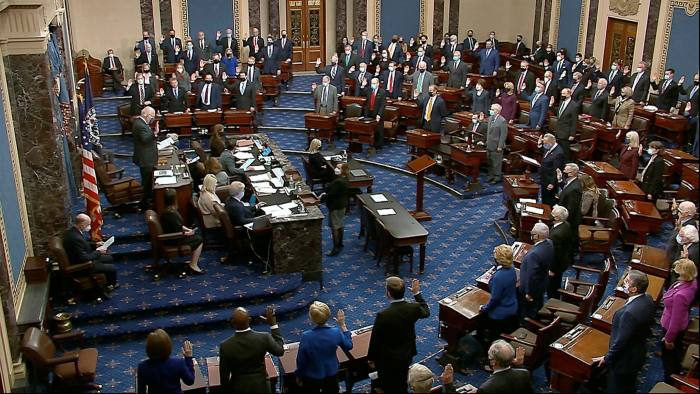In the early hours of 13 February, the Senate passed the long-awaited foreign supplemental aid package. The legislation, which includes assistance for Israel, Ukraine, and Taiwan, had strong bipartisan support. Despite their differences, Republican, Democratic, and Independent members of the Senate voted overwhelmingly in favor of the bill.
The bill’s passage in the Senate was the latest blow to Russian President Vladimir Putin. For months, members of the Senate and House of Representatives debated the supplemental aid package to Ukraine.
Some members of Congress argued that aid to these countries was too expensive. Others stated that assistance should be stopped altogether, and that the money being used to give aid to these countries should be used on other programs.
Then, in an attempt to delay the foreign assistance, some members of the House and Senate demanded that the foreign aid bill be tied to border security and national security reforms for the United States.
For several months, Republicans and Democrats debated, reviewed, and revised the joint legislation. But ultimately, discussions on border security were dropped, and the bill did not advance.
This was precisely what Putin would have hoped for. The longer the Senate debated foreign assistance for Israel, Ukraine, and Taiwan, the longer it would take for these countries to receive the aid they need to defend themselves from their aggressive neighbors.
In Ukraine’s case, this would give Russia time to regroup and strategize, which could further delay the end of the Russo-Ukraine war. Putin was also banking on Congress to fail in its attempts to pass this new foreign aid package.
But for now, Putin’s desires have not come to fruition. After four tedious and difficult months, the Senate passed the new foreign aid legislation.
After the failed attempt at border reforms, members of Congress restarted the debates on the foreign supplemental aid package. The bill passed 70-29 in favor of the legislation, highlighting American bipartisan support for the deal.
Earlier this month, the European Union agreed to a new aid package for Ukraine. The €50 billion deal will help Ukraine keep its economy afloat during the ongoing Russian invasion.
Before the passage of this package, elected officials in the Netherlands, Slovakia, and Hungary had begun to question additional assistance for Ukraine. However, their differences were eventually sorted out by the EU collective, and the body of 27 countries decided to proceed with the deal.
Having seen his anti-Ukraine efforts thwarted in the EU Council and now the US Senate, Putin will be banking on the US House of Representatives to block the foreign aid package.
This would be significant. While the Senate has already passed the new supplemental aid bill, the assistance listed in the package cannot be provided until the House passes it.
Currently, several Republicans within the House, including Speaker of the House Mike Johnson, oppose the supplemental aid bill. Johnson also said he would not be pressured by the Senate to bring the bill to a vote.
In other words, he is attempting to block it from being presented to the House floor.
But it remains to be seen how much longer Johnson can hold onto his veto.
Aside from receiving pressure from Senate Republicans and Democrats, some Republicans within the House are calling for a vote to support the supplemental aid package. There are also many House Republicans who support aid for Israel, Ukraine, and Taiwan, meaning if the House held a vote on the supplemental aid package, it would likely have strong bipartisan support.
Finally, some House members are exploring how to bypass Johnson’s opposition to the aid.
In other words, a lot can still happen between now and when the House chooses, if ever, to vote on the supplemental aid package. The bill could still fail. But support for Ukraine in the Senate, and advancing pressure in the House, suggests that things seem to be in favor of a successful passage of the bill.
This would bode well for America’s allies and partners, and it would be another blow to Putin and other autocratic rulers in the world. Time will tell what the final decision will be in the House on the US foreign assistance package.
Related:
- US Senate approves foreign aid bill, including $ 61 bn for Ukraine, but House may reject it
- How Ukraine aid became a hostage of the US border crisis
- How Ukraine can help itself in America’s disunited States

